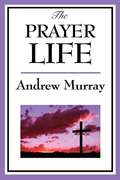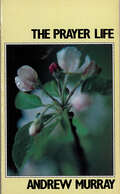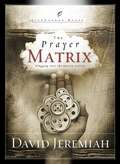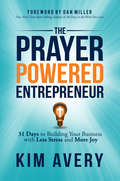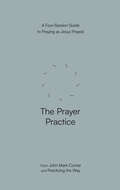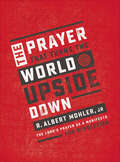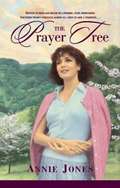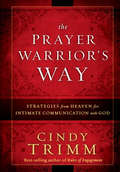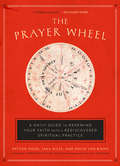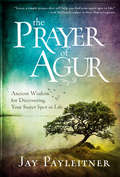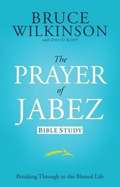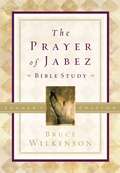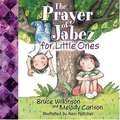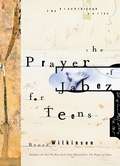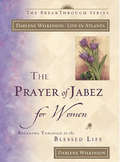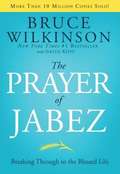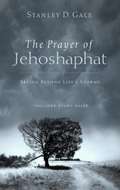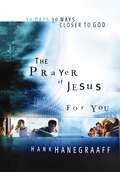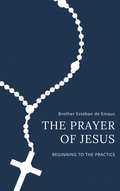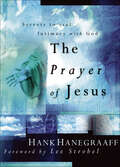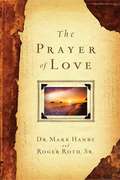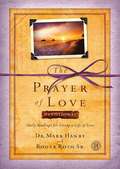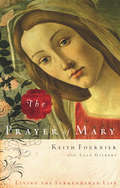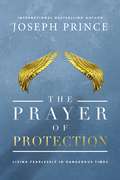- Table View
- List View
The Prayer Life
by Andrew MurrayIn "The Prayer Life," noted Christian author Andrew Murray addresses the problem of prayerlessness, a problem that knows no generational boundaries. Murray cuts to the heart of the problem, offering suggestions which, if followed, will have a serious impact on the life of the earnest reader. Murray explains that, since prayer is an outgrowth of abiding in Christ, prayerlessness is fundamentally a lack of abiding rather than simply a lack of prayer. "The Prayer Life" is a challenging call to a deeper Christian experience, out of which will naturally flow a life of prayer. Much more than a book on how to pray, "The Prayer Life" is a book on how to have a deeper spiritual walk.
The Prayer Life: Persevering In Prayer
by Andrew Murray"I had not supposed that just as He will give all other grace in answer to prayer, so, above all and before all, He will bestow the grace of a praying heart. What folly to think that all other blessings must come from Him, but that prayer, whereon everything else depends, must be obtained by personal effort! Thank God I begin to comprehend—the Lord Jesus is Himself in the inner chamber watching over me, and holding Himself responsible to teach me how to approach the Father. This only He demands—that I, with childlike confidence, wait upon Him and glorify Him."The Prayer Life is a searching inquiry into prayer as the key to spiritual blessing and victory. Andrew Murray has grappled with the sin which plagues every child of God—the sin of prayerlessness. The author exposes this weakness and with incisive clarity proposes a workable solution. His rare insight and practical suggestions bring the true difficulty into perspective while providing an opportunity for each believer to make definite progress in his spiritual experience.
The Prayer Matrix: Plugging into the Unseen Reality (LifeChange Books)
by Dr David JeremiahDavid Jeremiah approaches the good news of God's willingness to respond to our prayers from a fresh angle, describing prayer as the built-in trigger for the good things that happen in this world. Readers will discover just how eagerly God is waiting to answer us. Like a loving father, He is always glad to have us come to Him as children with the things that are on our heart! Prayer delights God's heart, because He has ordained the processes of the world to work through the prayers of His people.You Can Make a Difference Your prayers mean more than you realize. At the moment you pray, you connect to the most powerful force in the universe. You become an integral part of the rich, complex communication network of prayer. God has hard-wired the universe to work through prayer. It's breathtaking to realize that the all-powerful God intends you to have such a huge part in the work of ushering in His kingdom for all eternity. Enter the matrix and discover the ultimate reality--a reality beyond your imagination. Story Behind the BookEven Dr. Jeremiah struggles with prayer. He has read near 100 books on the subject. God is just waiting for His people to pray so that He can pour out His abundant blessing on them. Nothing is too big or too small to bring to God. He is waiting for you to pour out your requests to Him--and become part of the prayer matrix.
The Prayer Powered Entrepreneur: 31 Days to Building Your Business with Less Stress and More Joy
by Kim Avery&“A practical and powerful resource for any business owner who desires to do business led and empowered by God.&”—Shae Bynes, author of The Kingdom Driven Entrepreneur&’s Guide While Christian entrepreneurs start their days with prayer, the hustle and bustle of running their own businesses quickly takes focus away from their vital partnership with the almighty God. As a result, prayers for business are often broad, unfocused, and strictly tied to the entrepreneur&’s vision of ideal results. The Prayer Powered Entrepreneur model walks entrepreneurs through 31 days of recognizing God as CEO through an inside-out system of praying for transformation: In themselvesTheir relationship with GodTheir relationship with othersTheir relationship with their businessCulminating in praying for the impact they want their business to have in the world. Kim Avery encourages entrepreneurs to keep God at the center of everything, praying in alignment with the things He has already promised, and anticipating His daily activity in their lives. During this month-long journey, business owners learn how to build a better business, live a better life, and make a bigger impact—all through the simple practice of inside-out prayer. &“Kim Avery gives everyone who is called into such an entrepreneurial challenge a wealth of wisdom and an easy-to-implement practical tool to keep one going. Don&’t miss out on The Prayer Powered Entrepreneur! One does not have to face this challenge alone.&”—Bob Allums, director of A Praying Life Seminars from seeJesus Ministries, seeJesus.net &“A gold mine of inspiration, encouragement, and next steps toward a deeper relationship with God.&”—Marnie Swedberg, international leadership mentor & conference speaker
The Prayer Practice: A Four-Session Guide to Praying as Jesus Prayed
by John Mark Comer Practicing the WayLearn how to cultivate a deeper union with God through intentional, multifaceted prayer in this practical, accessible guide from New York Times bestselling author John Mark Comer and the team at Practicing the Way.In the hurry, distraction, and noise of the modern world, few things are more difficult or more rewarding than developing a life of prayer. As an apprentice of Jesus, it is vital to set aside time to be more deeply connected with the Father.Designed to be used with four engaging video sessions freely available online, the Prayer Practice from Practicing the Way offers spiritual exercises, reflection questions, guided readings, and additional resources to help you and your community.This guide will equip you to:• Develop a daily rhythm of prayer using both liturgical and personal approaches• Engage in various forms of prayer, including gratitude, lament, and intercession• Listen to God's voice through practices like Lectio Divina• Move beyond words to experience contemplative union with GodDiscover how dedicating intentional time to communicate and commune with God can lead to a transformed life, deeper spiritual growth, and a renewed sense of partnership with God in the world.Part of a series of nine core practices that together build a Rule of Life for following Jesus in the modern world, each guide can be read individually or together in any order:The Sabbath PracticeThe Prayer PracticeThe Fasting PracticeThe Solitude PracticeThe Generosity PracticeThe Scripture PracticeThe Community PracticeThe Service PracticeThe Witness Practice
The Prayer That Turns the World Upside Down: The Lord's Prayer as a Manifesto for Revolution
by R. Albert Mohler Jr.&“Our Father, who art in heaven….&”The opening words of the Lord&’s Prayer have become so familiar that we often speak them without a thought, sometimes without any awareness that we are speaking at all. But to the disciples who first heard these words from Jesus, the prayer was a thunderbolt, a radical new way to pray that changed them and the course of history.Far from a safe series of comforting words, the Lord&’s Prayer makes extraordinary claims, topples every earthly power, and announces God&’s reign over all things in heaven and on earth. In this groundbreaking new book, R. Albert Mohler Jr. recaptures the urgency and transformational nature of the prayer, revealing once again its remarkable, world-upending power. Step by step, phrase by phrase, The Prayer That Turns the World Upside Down explains what these words mean and how we are to pray them.The Lord&’s Prayer is the most powerful prayer in the Bible, taught by Jesus to those closest to him. We desperately need to relearn its power and practice. The Prayer That Turns the World Upside Down shows us how.
The Prayer Tree
by Annie JonesRosemary is an elderly widow who no longer knows where she fits in the world. Naomi is a recovering alcoholic still struggling with her demons. Gayle, supermom and superwife, knows she is a big, fat fraud-and is terrified she can't keep it a secret much longer. Lucy's biological clock has turned into a time bomb, just as her longtime boyfriend has dumped her. During one life-changing year, these four very different women come together to pray for their community, and end up helping each other confront-and triumph over-their disappointments and fears. Thought-provoking and emotionally-charged!
The Prayer Warrior's Way: Strategies from Heaven for Intimate Communication with God
by Cindy TrimmThere is a conversation that has been going on long before this universe was created. A conversation taking place in the spiritual realm. In the Garden of Eden, Adam and Eve were part of it. Throughout the history of humanity others have joined it, and there is something buried in each of our hearts that tells us we were created to be part of it as well. We long for it. We yearn to be in on it. But despite giving our lives to Christ and being born again in the Spirit, we don’t always know how to plug into it. So we stay in earth’s chat rooms rather than praying from heaven’s throne room. Even Jesus’ disciples did not ask Him how to preach, but how to pray. The Prayer Warrior’s Way is a practical guide for praying, enabling you to become versed in the basics necessary for talking to and hearing from God for yourself. Following the revolutionary prayer model Jesus gave to His disciples, Cindy Trimm gives you the keys to joining the most important conversation in the universe.
The Prayer Wheel: A Daily Guide to Renewing Your Faith with a Rediscovered Spiritual Practice
by Jana Riess Patton Dodd David Van BiemaAward-winning religion journalists describe a recently rediscovered medieval prayer tool that provides fresh inspiration and daily prayers for contemporary Christians.All people of faith struggle at times to sustain a flourishing prayer life--a loss felt all the more keenly in times like ours of confusion, political turbulence, and global calamity. The Prayer Wheel introduces an ancient prayer practice that offers a timeless solution for the modern faithful.The Prayer Wheel is a modern interpretation of the Liesborn Prayer Wheel, a beautiful, almost wholly forgotten, scripture-based mode of prayer that was developed in a medieval times. The Liesborn Prayer Wheel resurfaced in 2015 in a small private gallery near New York's Metropolitan Museum of Art. It faithfully and beautifully presents seven prayer paths for personal or group use. Each path invites contemplation on the "big ideas" of the Christian faith--the Lord's Prayer, the Beatitudes, the gifts of the Holy Spirit, and key words from the life of Christ.In the tradition of lectio divina and walking a labyrinth, The Prayer Wheel simply and directly takes readers into a daily, wholly unique encounter with God. As the prayers in this book unfold, readers will find an appealing guide for contemplation, a way of seeing God in new ways, and an essential new tool for Christian formation.
The Prayer of Agur: Ancient Wisdom for Discovering Your Sweet Spot in Life
by Jay Payleitner&“Learn a simple prayer that will help you find your sweet spot in life.&”—Josh McDowell, author of More Than a Carpenter&“Give me neither poverty nor riches, but give me only my daily bread.&”Proverbs 30:8This simple, unexpected request from a little-known biblical author named Agur is the only prayer in all of Proverbs, and it offers life-changing potential. Imagine finding new purpose and contentment in your work, personal ministry, and relationships. Open your heart to Agur&’s wit and wisdom, and you can learn to • escape imbalance• overcome fear of failure and eliminate envy• joyfully pursue your passions• reap the eternal rewards of trusting God• find your personal sweet spot In our modern, busy lives, embracing balance leads us away from bad decision-making and the emotional cost of trying to do too much or survive with too little. This engaging and practical book faithfully unpacks Agur&’s humble prayer. Read it in an evening. Affirm it for a lifetime. Share it with those you love.
The Prayer of Jabez
by Bruce H. WilkinsonDo you wish to be abundantly blessed by God? Dr. Bruce Wilkinson teaches that through recitation of the prayer of Jabez, one of the Bible's little-known heroes of the faith, you can experience the grace, the power and the protection of God.
The Prayer of Jabez Bible Study
by Bruce WilkinsonThe Prayer of Jabez Bible Study reveals how to make praying the Jabez prayer a lifetime habit. Readers will broaden their understanding of the four components of the Jabez prayer ("bless me; enlarge my borders; keep Your hand upon me; keep me from evil") by investigating key scriptural passages and learning how to apply them to their lives. Graphics and lighthearted illustrations make this innovative, four-week study impactful and fun. An eighty-page Leader's Edition with two additional, optional sessions is also available.
The Prayer of Jabez Bible Study Leader's Edition: Breaking Through to the Blessed Life
by Bruce WilkinsonReaders of Dr. Bruce Wilkinson's powerful bestseller, The Prayer of Jabez, learned how an audacious, four-part prayer could release God's miraculous power in their lives. Now The Prayer of Jabez Bible Study, Leader's Edition, reveals how to make praying the Jabez prayer a lifetime habit. Leaders will broaden their understanding of the four components of the Jabez prayer ("bless me; enlarge my borders; keep Your hand upon me; keep me from evil"). Graphics and lighthearted illustrations make this innovative, four-week study impactful and fun. The eighty-page Leader's Edition offers two additional, optional sessions and resources for group leadership.From the Trade Paperback edition.
The Prayer of Jabez for Little Ones
by Melody Carlson Bruce Wilkinson Alexi NatchevGod wants to bless all of us, including our young children. "Dear God, please bless me in a great, big way!" begins The Prayer of Jabez for Little Ones by Bruce Wilkinson and Melody Carlson, a board book written and illustrated especially for preschoolers to help them as they learn to pray and know God better -- a loving and strong God who listens when they pray and keeps them safe. Picture descriptions included.
The Prayer of Jabez for Teens (Breakthrough Series #2)
by Bruce WilkinsonToday's teenagers are learning to pray, and this tool is for them! The impact of The Prayer of Jabez has been phenomenal -- with reports of changed lives, expanded ministries, and massive spiritual breakthroughs among believers everywhere. Now teens can also receive extravagant blessing as they discover, in peer-based stories, supporting scriptures, and interactive questions, how to pray the remarkable prayer of the obscure Bible hero in I Chronicles 4:10. Teens seeking God's best for their lives will respond to the challenge of asking for blessing -- and being "blessable" before the Lord. Students, youth groups, and future church leaders will welcome The Prayer of Jabez for Teens. Includes group study leader's guide!
The Prayer of Jabez for Women
by Darlene Marie WilkinsonThe phenomenal impact of The Prayer of Jabez is shown by reports of changed lives, expanded ministries, and spiritual breakthroughs among believers everywhere. Now women have their own unique version, shared by Bruce Wilkinson's lifetime partner in marriage, that is full of significance for women's roles and ministry opportunities in God's kingdom. A must-hear for every woman, whether she has read The Prayer of Jabez or not, this audio addresses important questions such as, How can a busy mom expand her territory without neglecting the most important territory she already has, her family? Darlene Marie Wilkinson's warm, personable approach reaches out to her listener, encouraging her to become like Jabez and experience the extraordinary life.
The Prayer of Jabez: Breaking Through to the Blessed Life
by Bruce Wilkinson David KoppSimple Prayer, Dramatic Life-Change It’s a timeless prayer that produces timely results! Bruce Wilkinson takes readers to 1 Chronicles 4:10 to discover how they can release God’s miraculous power and experience the blessings God longs to give each of us. The life of Jabez, one of the Bible’s most overlooked heroes of the faith, bursts from unbroken pages of genealogies in an audacious, fourpart prayer that brings him an extraordinary measure of divine favor, anointing, and protection. Readers who commit to offering the same prayer on a regular basis will find themselves extravagantly blessed by God, and agents of His miraculous power, in everyday life. Banner Across Corner: 17 million Jabez series books in print! Do you want to be extravagantly blessed by God? Are you ready to reach for the extraordinary? To ask God for theabundantblessings He longs to give you? Join Bruce Wilkinson to discover how the remarkable prayer of a little-known Bible hero can release God’s favor, power, and protection. You’ll see how one daily prayer can help you leave the past behind-and break through to the life you were meant to live. Story Behind the Book WhenThe Prayer of Jabezfirst released in 2000 and sold nine million copies in two years, Bruce Wilkinson’s mailbox was flooded with countless personal stories of answered prayer. God’s mighty hand was using the prayer to change lives in both small and dramatic ways. Such undeniable testimonies make it impossible to ignore God’s presence, active and alive today! This repack meets the demand that continues to ask for the original bestseller-now with a stunning new look!
The Prayer of Jehoshaphat: Seeing Beyond Life's Storms
by Stanley D. GaleThe Prayer of Jehoshaphat develops King Jehoshaphat's prayer in 2 Chronicles 20 to give us focus, stability, strength, courage and direction in times of great distress. In the overwhelming circumstances that enter our lives, it directs us to take hold of the hand of our God who leads us from the point of crisis to gather up His blessings for us deposited by the storm.
The Prayer of Jesus for You
by Hank HanegraaffNow tweens and teens can also experience the power of praying Jesus' way! This 30-day prayer journal based on Hank Hanegraaff's The Prayer of Jesus, which has sold over 250,000 books, teaches foundational principles of prayer-but with fun, easy-to-understand applications. After an age-appropriate message, readers are prompted to record their own thoughts and prayers in a cool prayer tracker.
The Prayer of Jesus: Beginning to the Practice
by Brother Esteban de EmausThe experience of solitude and the intimate search for God in one’s own heart lead man to silence. In that void of thoughts, calm the cravings and calm the body, illuminate the Presence that has always been sought. Historical eremitism finds its root in this yearning for eternity and freedom from this very world. Paradise is present right now in the interior of the hermit, who by this very fact transfigures the world with his gaze. This loneliness of the heart is not necessarily due to the separation of men but to a life attentive to the divine presence, in any circumstance. This is also how the urban hermits live, who in their anonymous silence keep alive the original spirit of the first Christian communities; as close to Christ as they are away from all.
The Prayer of Jesus: Secrets to Real Intimacy with God
by Hank HanegraaffOver seven million people have purchased Bruce Wilkinson's The Prayer of Jabez. As a result, the book has reached the number one spot on the New York Times and USA Today's Best-seller Lists in addition to the CBA Best-seller List. The Prayer of Jabez highlights the remarkable prayer of a little-known Bible character and has, in effect, impacted millions of people across the world for Christ.Now author Hank Hanegraaff hopes to take these newly energized praying people to the next level in understanding the mystery of prayer. By delving into the prayers of Jesus Christ-the cornerstone of the Christian faith-readers will learn Jesus' seven-fold secret of prayer. In just one hour, readers will embark upon a truly exhilarating expedition that could radically change their prayer lives forever.
The Prayer of Love
by Roger Roth Mark HanbyThe Prayer of Love is about a little-known prayer that has the power to bring forth life transformation. Written in the pages of this book is an astounding little prayer that can dramatically change your life. Its words do not merely offer knowledge but, more important, are expressions of truths that have the ability to bring complete and lasting spiritual transformation. Many people today will never reach their full potential or become the person they sense is hidden inside, good people who desire to grow in love beyond their frustrations and weaknesses. They long for purpose, meaning, and fulfillment--to live a life of love--but have difficulty in finding it. I know how they feel. Through much adversity and with the help of God, this is what I've found. For all my struggle and disappointment, the answers to life's most difficult situations are usually simple. In fact, God is a God of simplicity. *** We are often the ones who make life difficult for ourselves. In fact, the answers to life's most difficult problems are usually simple. Jesus summed up the secret to life in a very uncomplicated, profound statement: Love God and love your neighbor as yourself. Jesus said that doing this fulfills all of God's requirements of us. That's where "The Prayer of Love" comes in. Whether you know how to love or you feel that love has eluded you, this prayer will change your life. This is because love is not meant to be an occasional feeling but a daily experience that continually brings peace and joy. "The Prayer of Love" is a little-known yet powerful prayer that the Apostle Paul prayed over the church he founded in Philippi in what is now Greece. The Prayer of Love follows the outline of this fifty-nine-word prayer and is broken down into seven parts that form benchmarks for understanding and maturing in love. The Prayer of Love is a small book with a simple prayer and a memorable, easy-to-follow method for developing the capacity to allow peace and love to rule in our lives every day.
The Prayer of Love Devotional
by Dr Mark Hanby Sr. Roger RothWith this joy-filled, forty-nine day devotional you'll learn to replace old ways with new habits of abundant love--and bring overflowing joy to your life.Based on the Prayer of Love from Philippians 1:9-10, this simple yet powerful book helps you develop love as a habitual way of life. As you reflect on each devotional, love will become more than an occasional feeling--all of your days will be filled with sustained peace. The first twenty-one days of the seven-week cycle focus on changing old habits. This is accomplished through inner evaluation, defining objectives, and commitment. The second twenty-one days are all about making new habits through strengthening character, operating in the supernatural, and living out your ideals. The final seven days will help you reinforce your new, loving habits through testimonies of a victorious life. The Prayer of Love Devotional is more than a collection of prayers; it is a guide to permanent change in your life. By investing just forty-nine days in this adventure in love, your life will take on new purpose and greater meaning.
The Prayer of Mary
by Keith FournierIn this readable, succinct volume, Keith Fournier portrays the young virgin of Nazareth in a fresh light as an antidote to the spiritual ills of the age. The Prayer of Mary presents humility, simplicity, and selfless love as fitting responses to the loving invitation of God, who visits people in their daily lives and invites them into a relationship with Him.
The Prayer of Protection: Living Fearlessly in Dangerous Times
by Joseph PrinceIn these days of danger, trouble, and evil, New York Times bestselling author Joseph Prince reveals how God's children can have round-the-clock protection through the power of prayer. THE PRAYER OF PROTECTION unveils the Bible's ultimate psalm of protection, Psalm 91, to help you understand more about how God guards His children. Joseph Prince offers simple keys and practical advice to finding and resting in the secret place of the Most High, where no evil can even come near you. You'll begin to live unafraid and with boldness as you allow the certainty of your heavenly Father's love and the sure promises of His Word to guard your heart against every fear. Come under the wings of the Almighty and live life divinely protected, positioned, and free from all fears with our covenant-keeping God!
